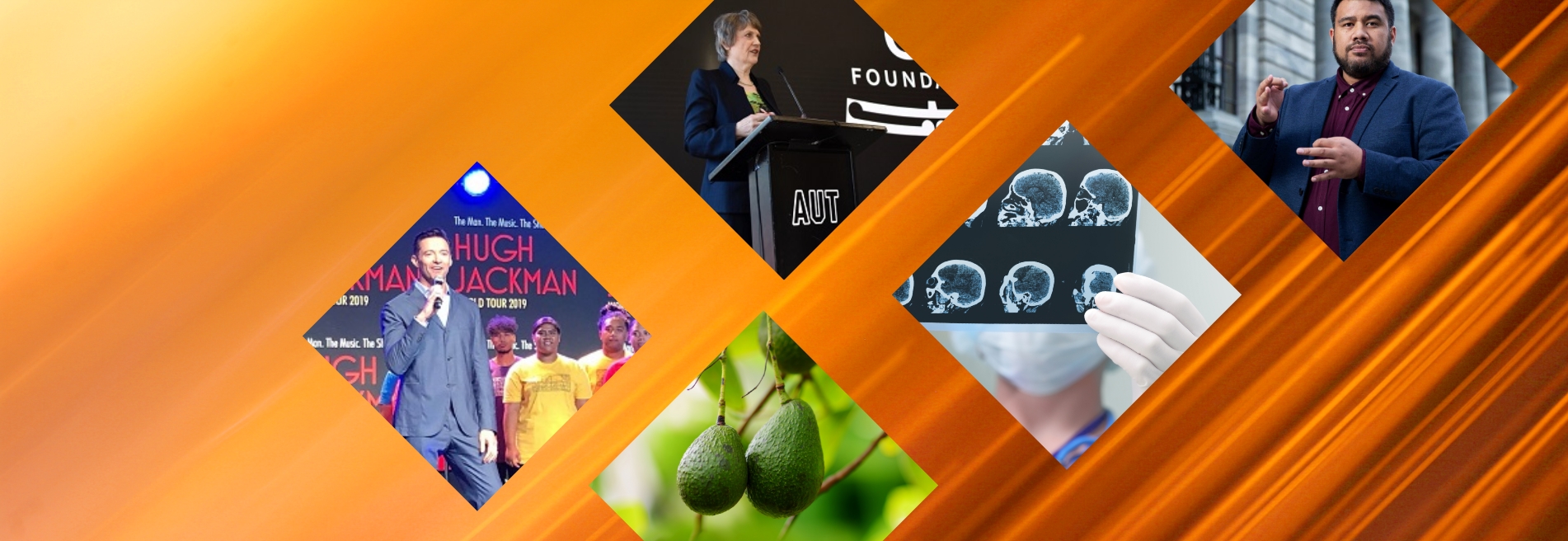Some exciting highlights from around AUT.
In 2019 AUT’s Oceanian Voices choir had a surprise visit from Hugh Jackman.
The Greatest Showman chose AUT South Campus to launch the New Zealand dates for his global arena tour –The Man, The Music, The Show.
In 2018 a video of Oceanian Voices’ performance of ‘This is Me’ went viral and caught the attention of Hugh and his team. The Greatest Showman songs were selected by the choir because the lyrics were particularly relevant and powerful to the students.
Later in 2019 the choir was invited to perform several songs alongside Hugh and performed a haka for the actor and members of the Nomad Two Worlds Foundation in his Auckland shows, putting AUT on the world stage.
School of Science PhD student Rahul Permal is working to convert avocado waste into compostable packaging by developing a compostable plastic made from their skids and seeds.
Large amounts of avocado seeds and skins are sent to landfill every year as a by-product of manufacturing avocado oil. Approximately 22,600 tonnes of avocados were grown in New Zealand during the 2017/2018 avocado season and the skin and seeds alone represented 5,900 tonnes of waste.
AUT alumnus Alan Wendt is the first sign language interpreter to be regularly employed by a New Zealand Prime Minister.
Until now, the permanent appointment was not considered the norm as interpreters were only occasionally employed during exceptional circumstances such as natural disasters.
It has been a busy year for Alan as Jacinda Ardern requested a sign language interpreter be present for her weekly post cabinet press conferences. He was also asked to translate at other major press conferences, including those following the Christchurch mosque attacks.
Everyone is at risk of experiencing a traumatic brain injury (TBI) or ‘concussion’ during their lifetime.
Nearly one in three people have experienced at least one traumatic brain injury by the age of 25. Some recover quickly, but nearly half go on to experience longterm problems.
For the approximately 36,000 New Zealanders who suffer a TBI each year, most are caused by falls, being hit by or hitting an object, motor vehicle accidents and assaults. The estimated annual cost to the public health system is
NZ $100 million.
In 2019, AUT launched the first Traumatic Brain Injury Network because in this area public awareness is low, healthcare is highly variable and there is a lack of evidence as to what works in treatment and recovery.
The network aims to foster collaboration and bridge the gap between research, clinical care, family, and policymakers in the prevention and treatment of traumatic brain injury.
AUT’s The Policy Observatory, which promotes and facilitates the ‘critic and conscience’ role of the University, has partnered with The Helen Clark Foundation.
The Former Prime Minister and United Nations Development Programme Administrator visited AUT in late March to launch her foundation - an independent, non-partisan public policy think tank.
The Helen Clark Foundation aims to contribute to a sustainable and peaceful society.
By publishing research that addresses issues such as justice reform, drug policy law reform and environmental issues, the foundation plans to fulfil its goal of gathering, interpreting and communicating evidence to support societal problems and propose new solutions to tackle them.
